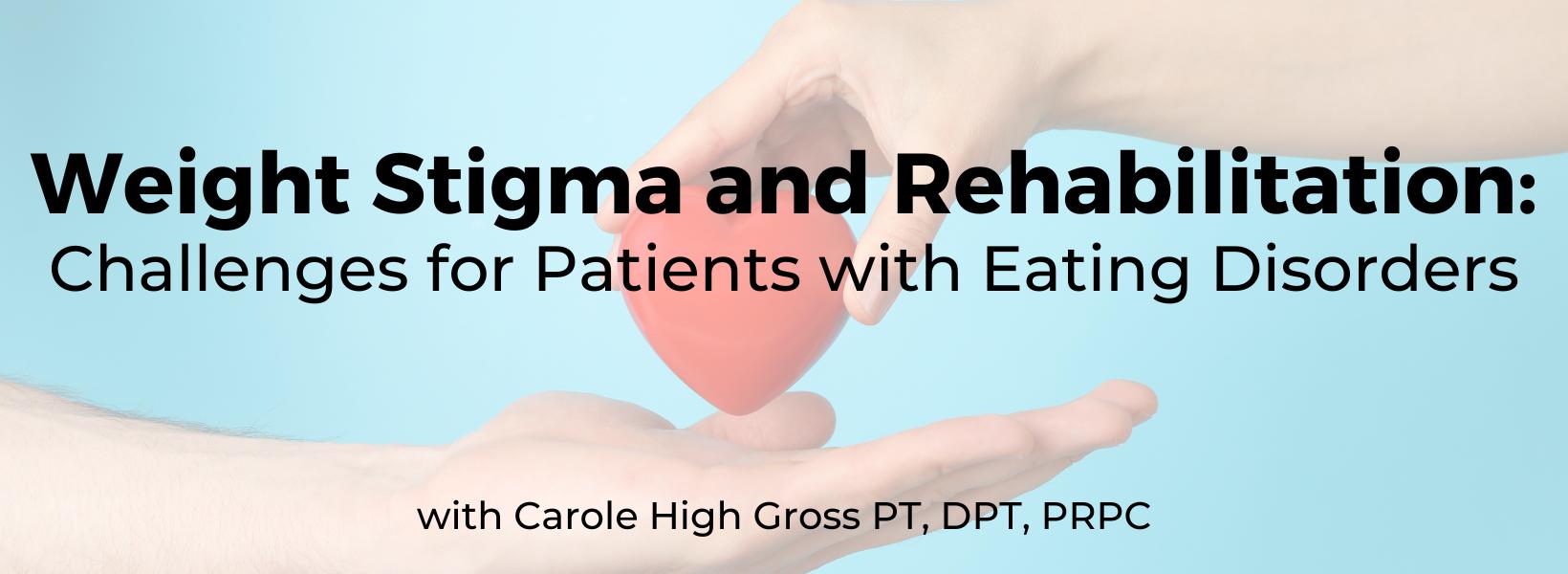Weight Stigma and Rehabilitation: Challenges for Patients with Eating Disorders

Carole High Gross, PT, MS, DPT, PRPC earned her Doctorate of Physical Therapy from Arcadia University in 2015, her Master of Science in Physical Therapy in 1992 from Thomas Jefferson University, and her Pelvic Rehabilitation Practitioner Certification in 2021. Carole works with Herman & Wallace as a Lead Teaching Assistant as well as an instructor for her own course Eating Disorders and Pelvic Health Rehabilitation. Carole serves on the Pelvic Workgroup of the Ehlers-Danlos International Consortium and has a special interest in working with individuals living with eating disorders, and hypermobility throughout the pregnancy and postpartum journey. In addition, Carole enjoys working with all genders with pelvic, bowel, bladder, and abdominal issues. You can join Carole in her next scheduled Eating Disorders and Pelvic Rehabilitation on October 28-29 2023.
The effects of weight stigma on individuals with and without clinical eating disorders are profound and detrimental. Weight stigma refers to the negative assumptions, attitudes, and beliefs that are directed towards a person based on their body weight, shape, or size. People with higher weight often experience stigma from health professionals, educators, peers, employers, the media, family, and friends.
Weight stigmatization may unintentionally occur with people who are seeking rehabilitation or medical services due to health professionals' implicit and explicit bias towards people with higher body weights. This negatively impacts the quality of healthcare and exacerbates the challenges of recovery for those struggling with eating disorders. In addition, the result of weight bias from health care providers impacts and reinforces increased internalization, negative body image, poor self-esteem, self-criticism, increased unhealthy eating behaviors, poorer health outcomes, and disruption of mental wellness. Fear of judgment or discrimination from a health care provider based on weight biases can lead to delayed or avoidance of health care, increased behaviors or symptoms, and increased risks of medical complications from eating disorders.
Eating Disorders are complex pervasive mental health conditions that affect people of all genders, cultures, ages, shapes, sizes, and weights. Eating disorders do not discriminate - and have serious physical, emotional, psychological, and physiological consequences. Unfortunately, eating disorders can, and are, life-threatening and can lead to multisystem medical complications of all body systems including the cardiovascular, gastrointestinal, integumentary, endocrine, musculoskeletal, urinary, and genital systems. In addition, individuals with eating disorders are at risk of low bone density, dental issues, incased body weight, and nutritional deficiencies. Often mental health dysfunctions occur with eating disorders including depression, mood disorders, anxiety, obsessive-compulsive disorder, self-harming behaviors, substance use disorder, and/or alcohol use disorder.
Pelvic health care providers may observe signs and symptoms of eating disorders such as upper or lower gastrointestinal symptoms and distress with constipation, esophageal dysfunction, reflux, delayed gastric emptying, abdominal pain, abdominal bloating, gastric dilation, or even superior mesenteric artery syndrome. Other reported symptoms may include diarrhea due to chronic laxative use, pelvic organ prolapse, urinary dysfunction, or pelvic pain.
Eating disorder behaviors exist in a cyclical nature and often cause gastrointestinal distress both during the state of malnutrition and with nutritional rehabilitation. Therefore, consequences of disordered behaviors may lead to further engagement in behaviors such as purging, binging, overeating, or food restriction. This increase in disordered behaviors may worsen and prolong the symptoms experienced. With increased awareness of the connections between symptoms and behaviors, healthcare providers can adapt the way they interact with these individuals.
The role of the health care provider is to provide support, advocacy, and guidance to all persons regardless of a person’s weight or size rather than providing judgment or criticism. The messages in society, health care systems, health profession schooling, social media, and news/entertainment media often portray “health” and “healthy” unrealistically. Health looks different for every person individually. Verbal, visual, or implied messaging of the societal and healthcare ideals of “health”, “thinness”, and “weight” contributes to negative self-worth and stigmatization of those living and suffering from diagnosed or undiagnosed eating disorders. Larger-bodied individuals often are stereotyped negatively implying moral or effort failures leading to their weight status.
Even unintentional weight stigma can lead to verbal or nonverbal negative messaging, interactions, comments, or suggestions. These messages can trigger harmful behaviors, lead to decreased trust, and promote hesitation to disclose or trust a provider with important information about their health or wellness. Unfortunately, there are biases that live inherently in all people - including healthcare professionals and individuals with eating disorders. Health professionals can make intentional efforts to recognize and challenge both conscious and unconscious weight biases with thoughts, interactions, and behaviors.
The saying: “You cannot judge a book by its cover” is relevant to all people. A person may be living with an eating disorder or engaging in harmful disordered eating behaviors despite how a body “looks” or appears. People living with a lower weight body, larger body, or at a perceived “healthy “or “normal” weight body may be struggling biologically, psychologically, and physically leading to life-altering and life-threatening medical complications and consequences. Stress of stigmatization resulting from direct experience or suspected or anticipated stigma can elicit physiological, psychological, and behavioral responses, which harm health over time. Studies have also shown that weight stigma can negatively impact cortisol levels in individuals who live in larger bodies.
The foundation of healthcare has always been to “do no harm”, however, often without malice or intent, this occurs every day. Often medical providers unintentionally reward and glorify restrictive behavior with individuals who may appear to be at a perceived “healthy” weight or those who are living in lower-weight bodies. Comments may be made with only the best of intentions, however, the interpretation and internalization of these comments could be extremely triggering for someone with an eating disorder. A casual expression of, “You look great!” or “Wow, did you lose some weight?” or “You look so healthy” could have incredibly negative effects on someone who has, or had, an active eating disorder.
Likewise, comments assigning moral value to food or body image/size can be equally destructive. This may look like a comment such as: “I was good today and didn’t have a cupcake” or “I was so bad today” (referring to eating a large lunch) or even “Don’t eat too much!” (when wishing someone a Happy Thanksgiving). For those who live in larger bodies, comments such as, “Well, maybe your knees wouldn’t hurt so much if you lost a little bit of weight”, or “We will have to pick a different exercise bike that you fit on comfortably” or “Let me go get the bigger blood pressure cuff” could be extremely traumatic and have a negative effect on their wellbeing.
Addressing weight stigma with rehabilitation is a multifaceted approach, including strategies to enhance a provider’s knowledge and awareness about eating disorders warning signs, symptoms, and manifestations. Education should also include strategies to evoke empathy and improve non-stigmatizing communication and language strategies. It is necessary for healthcare providers, and students, to learn strategies to encourage weight inclusivity and focus on an individual’s health and wellness, rather than focus on weight values in isolation. Assumptions and comments directed at a person’s weight or appearance should be avoided. Promotion of body positivity and self-acceptance will assist an individual in developing a healthier relationship with their bodies and can encourage someone to seek and receive appropriate treatment and support from trained mental wellness, medical, rehabilitation, and nutritional professionals.
The weight biases of health care professionals, including rehabilitation students and clinicians, present detrimental challenges to individuals living with eating disorders. These underlying biases contribute to negative effects including emotional distress, treatment barriers, and/or disruption of the therapeutic relationship between a healthcare professional and the patient. Healthcare professionals should provide a supportive, compassionate, and encouraging environment to facilitate improved treatment outcomes and recovery for individuals with eating disorders. Addressing the weight biases within the healthcare provider will assist in promoting a future when a person is treated with deserved respect and dignity regardless of their body weight.
The Association for Size Diversity and Health (ASDAH) is a nonprofit organization that is committed to the principle of Health at Every Size (HAES). This organization provides educational resources, referral opportunities, and networking of advocates and professionals who celebrate bodies of all shapes and sizes, and who envision a future in which people are not discriminated against based on body weight. The ASDAH also pursues opportunities for oppressed communities to receive equal access to resources that are supportive of health and well-being. Foundational principles of Health At Every Size (HAES) support that health exists on a continuum and varies for each person with time and circumstances. HAES principles also validate that health status is not a moral decision or obligation and should not be used to judge, oppress, or assign value to an individual.
The intention of this message is to open conversation, facilitate self-reflection, and encourage opportunities to consider subtle adaptations in our communications to improve our support to every person, regardless of body size or weight. As rehabilitation professionals, we have dedicated our lives to working with our patients to improve their quality of life and to assist them in achieving their goals. We work hard to help them to not just survive this life, but to thrive in this life. Awareness of the weight stigma within the healthcare system will help all of us achieve our goals.
Eating Disorders and Pelvic Health Rehabilitation: The Role of a Rehab Professional is a remote course, with pre-course teachable content, offered on October 28-29, 2023 instructed by H&W faculty member Carole High Gross PT, DPT, PRPC. This course will further explore different eating disorders, medical complications, signs/symptoms, and treatment strategies for individuals living with eating disorders. A full description and schedule of the course are available on the Herman & Wallace website. There is a lecture dedicated to weight stigma included in the pre-course Teachable content provided by Dr. Krista Rompolski, a fierce and dedicated advocate for reducing weight stigma within rehabilitation and health care.
References:
About Health At Every Size (HAES). Association for Size Diversity and Health. n.p. Accessed September 1, 2023. https://asdah.org/health-at-every-size-haes-approach/
Gaudiani JL. Sick Enough: A Guide to the Medical Complications of Eating Disorders. Routledge; 2019.
McEntee ML, Philip SR, Phelan SM. Dismantling weight stigma in eating disorder treatment: Next steps for the field. Front Psychiatry. 2023;14:1157594. Published 2023 Apr 11. doi:10.3389/fpsyt.2023.1157594
Puhl RM, Neumark-Sztainer D, Austin SB, Luedicke J, King KM. Setting policy priorities to address eating disorders and weight stigma: views from the field of eating disorders and the US general public. BMC Public Health. 2014;14:524. Published 2014 May 29. doi:10.1186/1471-2458-14-524
Puhl RM, Heuer CA. Obesity stigma: important considerations for public health. Am J Public Health. 2010;100(6):1019-1028. doi:10.2105/AJPH.2009.159491
Talumaa B, Brown A, Batterham RL, Kalea AZ. Effective strategies in ending weight stigma in healthcare. Obes Rev. 2022;23(10):e13494. doi:10.1111/obr.13494
Weight Stigma. National Eating Disorders Collaboration. n.p. Accessed September 1, 2023. https://nedc.com.au/eating-disorders/eating-disorders-explained/weight-stigma/
Eating Disorders and Pelvic Health Rehabilitation

Price: $495.00 Experience Level: Beginner Contact Hours: 17 hours
Course Date: October 28-29 2023, April 6-7 2024
Description: This course explores types of eating disorders including anorexia nervosa, bulimia nervosa, binge eating disorder, ARFID (Avoidant Restrictive Feeding Intake Disorder), and OSFED (Otherwise Specified Feeding and Eating Disorder). We will also discuss conditions that do not yet have formal diagnostic criteria such as orthorexia and diabulimia and we will touch on Pica and Rumination Disorders.
Interviews with eating disorder professionals from throughout the country are included in the pre-course lecture to deepen the understanding of the multidimensional effects of eating disorders and the multidisciplinary team necessary to provide support for these individuals.
By accepting you will be accessing a service provided by a third-party external to https://hermanwallace.com/







































